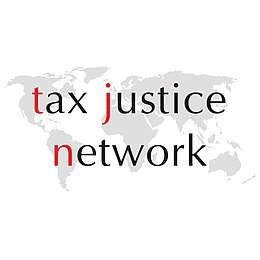Tax Justice Network
 | |
| Abbreviation | TJN |
|---|---|
| Formation |
March 2003 formal November 2002 informal |
| Founder | 28 co-founders[1] |
| Founded at | London |
| Type | NGO |
| Focus | tax avoidance, tax competition, tax evasion, and tax havens. |
| Headquarters | 38 Stanley Avenue, Chesham, Buckinghamshire, HP5 2JG, United Kingdom. |
Official language | English |
Chairman | John Christensen |
Chief Executive | Alex Cobham |
Revenue
(2016) | £1,111,981 ($1,556,773) |
| Website |
www |
The Tax Justice Network (or TJN), is an independent advocacy group consisting of a coalition of international researchers and activists with a shared concern about tax avoidance, tax competition, tax evasion, and tax havens. It has a particular focus on offshore financial centres that behave as corporate tax havens. The Tax Justice Network gathers organizations, social movements, and advocates for international tax cooperation, and against tax evasion and tax competition. TJN's goal is to achieve progressive, democratic, and socially just tax systems. It carries out campaigns from an internationalist perspective whose purpose is to develop a fiscal system that is favourable to the poor in developing and developed countries, that finances public good, and that mitigates public wrongs such as pollution and unacceptable inequality.
Foundation and growth
TJN grew out thank to the process of the global social forum and the international movement of ATTAC. TJN is a multilingual, non-partisan, non-governmental, plural and diverse network. It has as members and militants’ organizations of social movements and national, regional and local civil society, as well as activists for justice in taxes, researchers, journalists, development specialists, trade unionists, and professionals of taxation, politicians and officials.
Civil Society is progressively committing itself to the issues of capital flight, tax evasion and tax fraud and competition, which are generally seen as obstacles to the mobilization of national resources in developing countries. In June 2000, one of the main NGOs dedicated to development published a report titled Tax Havens: “Unlocking the hidden billions to eradicate poverty”. The creation of the Tax Justice Network was in part a consequence of the publication of that report. In the United States, the Citizens for Tax Justice Organization has undertaken a similar effort, although with a national focus. On the contrary, TJN focuses primarily on the international level.
Since 2000, ATTAC, which was born in France in support of the called Tobin tax, has become a movement of international pressure that faces the problems of tax fraud, financial crime and the abuse of tax havens. In April 2005, ATTAC-Spain asked the Government not to recognize the fictitious and instrumental companies registered in tax havens before the Spanish legal system. And ATTAC-Germany played a decisive role in the creation of Tax Justice Network, whose diffusion is spreading in the Spanish-speaking countries.
Until recently, international fiscal policy was hardly a field for civil campaigns, as can be demonstrated by an example. In June 2003, the G8 meeting in Evian summoned 300,000 demonstrators in Geneva, 3,000 people registered to pressure the delegates and Geneva came to a standstill. In December 2003 the UN Committee of Fiscal Experts met in Geneva and TJN was the only civil society organization that attended and intervened in the meeting.
Functions and objectives.
The main purpose is to combat the lobbying activities of accounting, business or law organizations that use considerable amounts of time and money to ensure favourable tax treatment for wealthy individuals and powerful organizations that shape their customers. Other functions of TJN:
- Conducts campaigns for social change through public debate and education. Public understanding of tax issues is the pre-requirement for international tax justice. The Network makes information available through the media as well as through conferences and seminars, the Internet, news bulletins, printed publications, symbolic actions, demonstrations and promotion and defense of its objectives. We base our activities on solvent research and expert knowledge.
- Facilitates cooperation among its members and sharing information and communication. It organizes international exchange and policy debates to harmonize the opinions and concerns of our members. This process forms the basis for the comprehensive global campaigns on international fiscal policy.
Management
It is managed by its member organizations as well as by individual militants. It ensures the visibility of member organizations in their activities and participation in the decision-making of the Network. It operates in accordance with the principles of participatory democracy, its empowerment, transparency, accountability and equal opportunities. TJN encourages and supports, when necessary, member organizations and individuals to participate in decision making. The Network supports the development of national TJN campaigns, particularly in developing countries. The activities of the Network are coordinated by an international secretariat. The Network includes:
- national, regional and local civil society (specially important)
- development organizations and several NGOs
- religious groups
- unions
- researchers
- journalists
- economists
- financial professionals
Empirical results
In March 2005, TJN published the results of an investigation that demonstrated $ 11.5 million of the personal wealth of wealthy individuals held in offshore financial centers. In addition, to minimize taxes or to avoid paying them, a large proportion of this wealth is managed in about 70 tax havens. If the income from this wealth patrimony will pay the taxes in the countries where these rich individuals reside or where they obtain their wealth, the additional tax collection available for the financing of public services and for investment in the whole world would be around 255,000 million of annual dollars. We emphasize that this estimate of the loss of tax revenues does not include the tax evasion of transnational corporations or the reduction of tax revenues caused by tax competition.[2]
Focus
The Financial Secrecy Index is a biennial publication of the TJN which was started in 2009 and was last released in January 2018. It covers 112 global jurisdictions and produces a "Secrecy Indicator" score for each on based on 20 qualitative criteria. Releases are widely covered in the media.[3][4][5][6]
The TJN has reported on the OECD Base erosion and profit shifting (BEPS) projects and conducted their own research that the scale of corporate taxes being avoided by multinationals is an estimated $660bn in 2012 (a quarter of US multinationals’ gross profits), which is equivalent to 0.9% of World GDP.[7][8]
In July 2012, following a study into wealthy individuals with offshore accounts, the Tax Justice Network published claims regarding deposits worth at least $21 trillion (£13 trillion), potentially even $32 trillion, in secretive tax havens. As a result, governments suffer a lack of income taxes of up to $280 billion.[9][10][11]
Other
- Experts of TJN appeared at public hearings of the Finance Committee of the German Bundestag.[12]
See also
Notes
- ↑ "Happy Birthday Tax Justice Network". TJN. 9 November 2012.
- ↑ "The Price of Offshore" (PDF). Tax Justice Network. 2018.
- ↑ "Report Says U.S. Is World's Second-Biggest Tax Haven". Bloomberg News. 30 January 2018.
- ↑ "U.S. Becomes World's Second-Biggest Tax Haven". Wall Street Journal. 30 January 2018.
- ↑ "UN urged to launch global effort to end offshore tax evasion". The Guardian. 30 January 2018.
- ↑ "Australia a safe haven for illicit funds, but Switzerland the world's worst". Sydney Morning Herald. 31 January 2018.
- ↑ "Tax Avoidance Costing U.S. $189 Billion: Tax Justice Network". Bloomberg News. 23 March 2017.
- ↑ "Base Erosion and Profit Shifting BEPS". Tax Justice Network. 2015.
- ↑ "13 trillion pounds in offshore tax havens: Report". The Times of India. July 22, 2012. Retrieved July 22, 2012.
- ↑ "Super rich hold $32 trillion in offshore havens". Reuters. July 22, 2012. Retrieved July 22, 2012.
- ↑ "Tax havens: Super-rich 'hiding' at least $21tn". BBC. July 22, 2012. Retrieved July 22, 2012.
- ↑ "Öffentliche Sitzung des Finanzausschusses" (in German). German Bundestag. June 15, 2016. Retrieved February 16, 2017.
External links
- Tax Justice Network
- Briefing Paper of the TJN
- TJN Co-founder Richard Murphy Tax Blog
- Bullough, Oliver. "The Fall of Jersey: How a Tax Haven Goes Bust," The Guardian online, 8 December 2015 - includes an interview with John Christensen, a native of Jersey, about the origins of TJN
